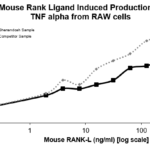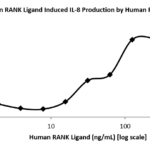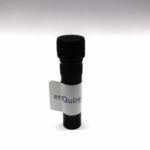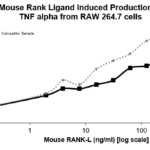Mouse RANKL / OPGL / TNFSF11 / CD254 Recombinant Protein Product Attributes
Product Type: Recombinant Protein
Recombinant RANKL / OPGL / TNFSF11 / CD254 based upon sequence from Mouse
Host: QP6818 protein expressed in E. coli.
Tag: His-SUMO
Protein Construction: A DNA sequence encoding the Mus musculus (Mouse) RANKL / OPGL / TNFSF11 / CD254, was expressed in the hosts and tags indicated. Please select your host/tag option, above.
Recommended Applications: Immunogen, Protein Standard, Cell culture, or Other Cell Biology Applications.
Application Notes: Please contact us for application specific information for QP6818.
Bioactivity Data: Untested
Full Length? Extracellular Domain
Expression Region: Tyr70 – Asp316
Amino Acid Sequence: YFRAQMDPNR ISEDSTHCFY RILRLHENAD LQDSTLESED TLPDSCRRMK QAFQGAVQKE LQHIVGPQRF SGAPAMMEGS WLDVAQRGKP EAQPFAHLTI NAASIPSGSH KVTLSSWYHD RGWAKISNMT LSNGKLRVNQ DGFYYLYANI CFRHHETSGS VPTDYLQLMV YVVKTSIKIP SSHNLMKGGS TKNWSGNSEF HFYSINVGGF FKLRAGEEIS IQVSNPSLLD PDQDATYFGA FKVQDID
Purity: Greater than 90% as determined by SDS-PAGE.
Reconstitution Instructions: Concentrated protein in liquid format. Reconstitution is not necessary.
Concentration of Mouse RANKL / OPGL / TNFSF11 / CD254 Protein:
Endotoxin Levels: Not determined.
Buffer: Tris-based buffer, 50% glycerol
Storage Conditions: Store at -20C to -80C.
| Recombinant Mouse RANKL / OPGL / TNFSF11 / CD254 Protein General Information | |
|---|---|
| Alternate Names | |
| RANKL, OPGL, TNFSF11, CD254, ODF, TNLG6B, sOdf, TRANCE, hRANKL2, OPGL, CD254, RANKL, OPTB2 | |
| Curated Database and Bioinformatic Data | |
| Gene Symbol | Tnfsf11 |
| Entrez Gene ID | 21943 |
| Ensemble Gene ID | ENSMUSG00000022015 |
| RefSeq Protein Accession(s) | NP_035743.2 |
| RefSeq mRNA Accession(s) | NM_011613.3 |
| UniProt ID(s) | O35235 |
| UniGene ID(s) | Mm.249221 |
| COSMIC ID Link(s) | TNFSF11 |
| KEGG Gene ID(s) | mmu:21943 |
| General Description of Recombinant Mouse RANKL / OPGL / TNFSF11 / CD254 Protein. | |
| Cytokine that binds to TNFRSF11B/OPG and to TNFRSF11A/RANK. Osteoclast differentiation and activation factor. Augments the ability of dendritic cells to stimulate naive T-cell proliferation. May be an important regulator of interactions between T-cells and dendritic cells and may play a role in the regulation of the T-cell-dependent immune response. May also play an important role in enhanced bone-resorption in humoral hypercalcemia of malignancy. | |
Limitations and Performance Guarantee
This is a life science research product (for Research Use Only). This product is guaranteed to work for a period of two years when stored at -70C or colder, and one year when aliquoted and stored at -20C.








There are no reviews yet.